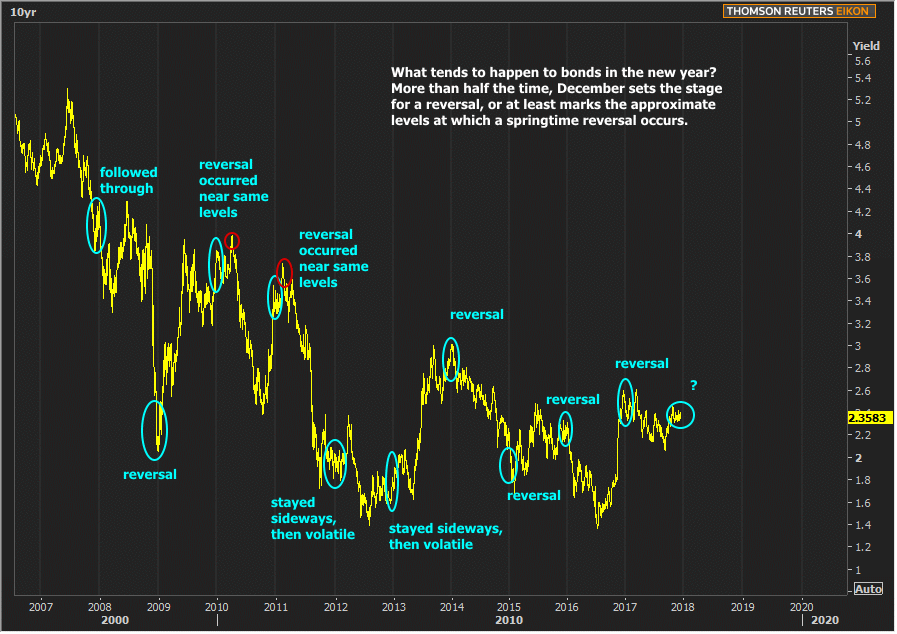From time to time, a discussion will start up among MBS Live community members regarding certain habits for certain months of the year. Some popular observations have been "bonds always sell-off in October" and "there's always volatility in March."
Of course nothing in financial markets will ever "always" do the same thing (because anything that can be known with certainty is already priced in to current trading levels), but some general trends do seem to emerge more often than others. Whether or not this is mere coincidence is hard to say. We can almost always identify underlying reasons for the movement seen.
Still, for the past several years, and indeed in more than half the cases since the Financial Crisis, bonds have done something substantially similar moving from one year into the next.

As you can see in the chart, the last 5 Decembers have all been high water marks (or close to it) for 10yr yields. Even in cases like 2009 and 2010 where bonds ended up selling off in the first part of the following year, the sell-off didn't take yields too much higher before they reversed course in a fairly major way.
Does this PROVE that bonds MUST rally in a few weeks? I wish it were that simple (or that awesome)! The current trading year looks quite a bit like 2012, which gave way to 2013--not a pleasant year for bonds. 2013 raises another good point: big enough events will always create logical momentum in bonds. In 2013, it was the taper tantrum that logically caused a massive sell-off.
This time around, we don't have the same sort of risks in play compared to 2013. The big-picture developments at stake aren't so unabashedly focused on the core of bond market supply and demand in the way that quantitative easing was (and still is). Much of the big-sell-off that should result from a Trump Administration creating more Treasury supply (borrowing money to fund "stuff" like tax reform and other government spending that's been alluded to) has already occurred before the events actually arrive.
While that doesn't necessarily mean bonds couldn't continue to sell when the rubber actually meets the road, it absolutely means that there's massive rally potential if the wheels fall of the tax bill. That's really the only high probability "if/then" at the moment. We received hints as to that possibility yesterday with Rubio and Lee threatening to pull their votes if they didn't get what they wanted. It's probably just politicians playing politics, but if it turns into something serious, bonds will react accordingly in the short term.
All that having been said, it's an incredible long-shot. I don't think the GOP would have come this far and gone through this much only to close shop and say "well, I guess we can't do the tax bill after all." Political suicide would be an understatement (not because voters would shun them, but rather because DONORS would pull funding, basically guaranteeing a big democratic majority after the next round of elections).
The GOP's only hope for survival is to pass a tax bill and then to pass it off to the public like something that will actually help them as opposed to further turning the crank on the wealth inequality problem. The hope that a few dissenters can derail the whole thing is no reason for a mortgage person to favor floating vs locking. Nonetheless, it could create opportunities in the short term.
Lawmakers are expected to announce new details on the joint tax bill today, with voting happening by early next week. In this case, there's effectively zero chance they'll go to a vote before knowing the outcome. Going to a vote means the tax bill passes. Either that or a republican Senator has opted for early retirement in order to write a book on how they changed they world.





